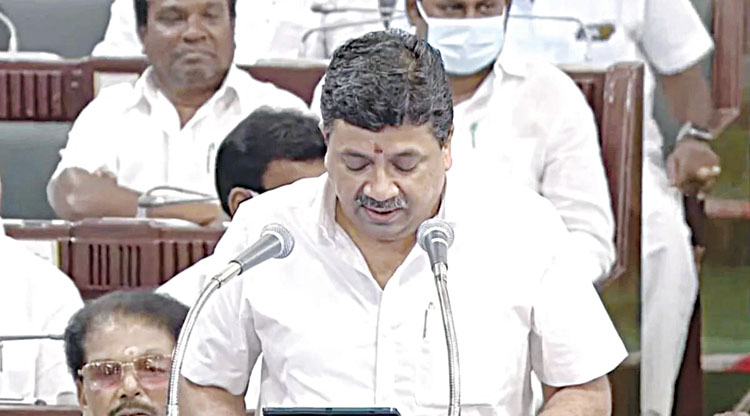Chennai, Apr 28 (Representative) A day after Prime Minister Narendra Modi urged some States, including Tamil Nadu, to cut taxes on fuel, Finance Minister PTR Palanivel Thiagarajan today said given that the Union Government’s taxes continue to be exorbitant, it is neither fair nor feasible for the State Government to further reduce taxes. In a statement here, he said “We have repeatedly urged the Union Government to reduce the cesses and surcharges being levied and merge them with the basic tax rates so that States get their rightful share from the proceeds of the Union taxes”. “Given that the Union Government’s taxes continue to be exorbitant, it is neither fair nor feasible for the State Government to further reduce taxes. We reiterate that the sole, simple, and fair approach to improve the situation for all, is for the Union Government to remove the levy of cesses and surcharges and revert to rates that prevailed in 2014”, he said and hoped that the Union Government will heed to this reasonable request in the true spirit of co-operative federalism. He said contrary to Modi’s remarks, the State Government under the able leadership of Chief Minister M.K.Stalin had in fact cut the VAT on petrol back in August 2021, prior to the Union Government’s action. “That cut resulted in a relief of Rs.3 per litre to the citizens of Tamil Nadu. It was estimated that the State would incur a loss of Rs. 1,160 crores annually due to this reduction.
Yet this was done, despite the financial strain inherited from the previous government, to reduce the burden on the people”, the Minister said. On the other hand, the Union Government’s levies on petrol have gone up substantially in the past 7 years since the Prime Minister took charge for the first time in 2014. Though the revenue to the Union Government has increased manifold, there has not been a matching increase in the revenues to States. This is because the Union Government has increased the cess and surcharge on petrol and diesel, while reducing the basic excise duty that is shareable with the States, he said. In 2020-21, the revenue to the Union Government from levies on petrol and diesel was Rs.3,89,622 crore which was 63 percent higher than the revenue of Rs.2,39,452 crore in 2019-20, Palanivel Thiagarajan said. On the other hand, the Tamil Nadu Government in 2020-21 received only Rs.837.75 crore as share of the tax devolution from the Union Excise Duties on petrol and diesel as against the Rs.1,163.13 crore received in 2019-20. On November 3, 2021 the Union Government announced a tax reduction of Rs.5 per litre on petrol and Rs. 10 per litre for diesel. Since Tamil Nadu levies ‘ad valorem’ taxes which are applied after Union taxes, this move by the Union causes an additional loss of about Rs. 1,050 crores in annual revenue to Tamil Nadu, he added.
On August one, 2014, the basic price was Rs. 48.55 per litre for petrol and Rs.47.27 per litre for diesel. On 04.11.2021, the basic price of petrol was Rs.48.36 per litre while that of diesel was Rs. 49.69 per litre and the Union Government taxes were Rs. 9.48 per litre on petrol and Rs. 3.57 per litre on diesel. At that time, the State Government taxes were at Rs. 15.67 per litre on petrol and Rs. 10.25 per litre on diesel. Prior to the reduction of taxes on petrol and diesel by Union Government, the levy of tax, including cesses and surcharges by Union Government on petrol was Rs. 32.90 per litre and Rs. 31.80 per litre on diesel. This has been reduced to Rs. 27.90 per litre for petrol and Rs. 21.80 per litre for diesel after the cut. So, when compared to 2014 (when basic price was roughly the same), the Union Government still levies an additional tax of Rs. 18.42 per litre for petrol (an increase of roughly 200%) and Rs. 18.23 per litre for diesel (an increase of over 500%) compared to the taxes in effect when it took office in 2014, the Minister said. Palanivel Thiagarajan said in Tamil Nadu, the Government currently levies tax to the tune of Rs.22.54 per litre on petrol and Rs. 18.45 per litre on diesel.
The additional taxes, relative to the 2014 level, imposed by the previous AIADMK Government were reduced by the ruling DMK by Rs. 3 per litre on petrol in August 2021. It is pertinent to mention that after the advent of the GST regime, the States have lost substantial powers to levy their own taxes and raise revenue. The States faced a double whammy due to the Covid pandemic, with their finances being severely affected and also incurring large scale additional expenditure towards Covid relief activities. Further, the GST compensation regime comes to an end on June 30 this year and most states including Tamil Nadu have already requested the compensation to be extended considering the strain caused by the pandemic on State finances. However, there is no clarity from the Union Government on whether the compensation will continue or not after June 30, 2022. “DMK Governments have always been ardent proponents of co-operative federalism and have been practising it in letter and spirit from the days of late Chief Ministers Perarignar Anna (C N Annadurai), and Muthamizh Arignar Kalaignar (M.Karunanidhi), and we continue to do so under our present Chief Minister”, Palanivel said.

